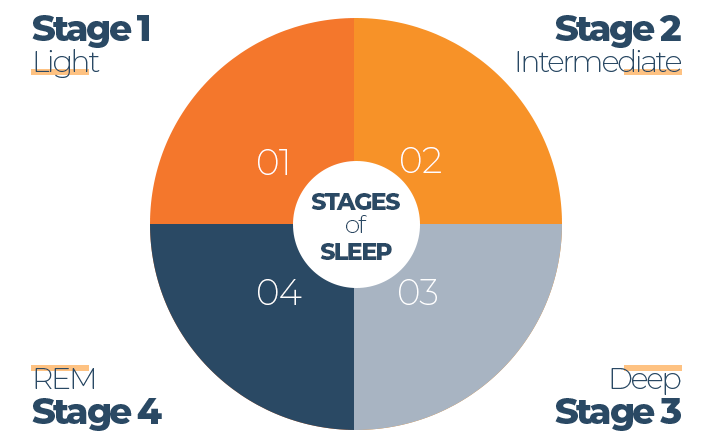What is Segmented, or Polyphasic, Sleep?
Segmented sleep is also referred to as “polyphasic sleep.” Instead of sleeping in one large chunk of time during the night, your rest takes place in two or more sessions.[1]
The word itself almost requires no definition as poly means many or more than one. Phasic refers to phases, and you probably already know that a phase is a time period or stage. Therefore, people who engage in polyphasic sleep, are going to bed in segments.
For example, someone who has this type of schedule may go to bed at 9 p.m. and then wake up around midnight. These sleepers will stay awake for a couple of hours, then fall back to bed until the morning. In this example, there are only two phases, which is considered biphasic or bimodal.
Still, depending on how it’s practiced, those who engage in segmented sleeping behavior could rest in as many as eight different periods in a 24-hour cycle. Although considered by many to be unhealthy today, this method of sleeping is how our ancestors slept until the late 19th century.
Monophasic Vs. Biphasic Vs. Polyphasic
Most of us adhere to monophasic sleep and only sleep once during each day, at night.
Biphasic sleep is a pattern in which involved a person sleeping for two segments, each 24 hours. Typically biphasic sleep refers to sleeping during the night and taking a midday nap.
Polyphasic sleep refers to a person sleeping for three or more periods every 24 hours. For example, 9 PM to 12 midnight, 3 AM to 6 AM, and 1 PM to 3 PM.
The History Behind Polyphasic Sleep
Historians believe that this way of sleeping is how humans naturally evolved. There are written accounts of this way of resting that go back nearly 3,000 years, where polyphasic sleeping is referenced in Homer’s Odyssey.[2]
People across cultures and from all walks of life slept this way. The “in-between” time was considered sacred. Some would use this time to pray or visit neighbors, while others used it for sexual relations with their partners.
Improved Conception
According to the book At Day’s Close: Night in Times Past, doctors in France during the 16th century referred to this time window as dorveille, which, when translated, means a dreamlike semi-conscious state. These doctors advised patients that the time between sleeping periods was ideal for conception. They even went as far as to claim that couples would “have more enjoyment” and “do it better.”
The leading theory behind this recommendation is that we would get drowsy and tired from long, laborious days as darkness approached. Instead of trying to muster up the energy for a roll in the hay, it would be better for both parties to take a nap first. Then, after a few hours of shuteye, couples felt refreshed and ready to enjoy each other’s physical company.
Evolving Sleep Styles with Evolving Lifestyles
Though this slumber style began to fall out of favor in the late 17th century, the upper classes in urban areas were the first to eschew this practice. Historians believe this was due to having more leisure time and social opportunities, which created the idea of nightlife.
Over the next couple hundred years, the practice faded further, and by 1920, society as a whole had abandoned the idea of a first and second sleep.[3]
Find Out More: The History of Human Sleep
Segmented Sleep & Sleep Architecture
In a typical seven to nine-hour bedtime block, distinct stages will make up a cycle. A complete sleep cycle has five stages ranging from light rest to REM (rapid eye movement), which is the time when we dream. Interspersed within that are multiple periods of SWS or slow-wave sleep.[4]
Instead of being repeated in brief periods throughout the night, those who engage in segmented sleep will experience a hefty dose of SWS in their first three hours of rest. The SWS stage is associated with deep, restorative sleep, often resulting in people feeling more well-rested.
When the person begins their second stage of sleeping, they’ll spend much of it in REM. The result is a more vivid remembrance of dreams and a higher likelihood of lucid dreaming.
How It Affects Hormones
Prolactin
Prolactin is a hormone that is most famous for enabling female mammals to produce breast milk. However, it also has a role in sleeping that’s not widely known.
Biologists have discovered that it’s more beneficial to release a surge of prolactin at night rather than have a steady stream of it coursing through the body for the entire day. It also influences sex hormones like testosterone and estrogen. So when people rest in segments, they’re able to regulate the production of prolactin better, having higher concentrations in the wee hours of the morning.
The result of polyphasic sleep, then, is an increased libido and a better balance of hormones.
Advantages of Segmented Sleep
Some of humanity’s most celebrated authors have referred to the benefits of segmented sleep, including Jane Austen, Charles Dickens, and Leo Tolstoy, to name a few.
This quiet in-between time is almost like getting a few bonus hours per day to accomplish more.
Here are some key advantages:
- Relish quiet time without demands of work, family, or social distractions
- Use the time to meditate and reflect
- Enjoy intimacy with a partner
- Potentially increase chances of conception
- Those who are religious may view it as a time to communicate with God
- Catch up on chores so that you can begin the day ahead of schedule
- Get more quality rest in two periods than you may get in one uninterrupted block
- Increase dream recall and the chance to experience lucid dreaming
Learn More: How Geniuses Sleep?
Disadvantages of Segmented Sleep
With all of those advantages, why isn’t everyone sleeping in shifts? Well, it turns out that modern society complicates things.
Here are some disadvantages to changing your schedule:
- If you use any artificial light during this time (a TV, or phone, for example), it can disrupt your internal clock
- It may be challenging to fall back to bed
Frequently Asked Questions
What is a triphasic sleep schedule?
A triphasic schedule involves three naps during 24 hours, hence the prefix of “tri.” These napping times coincide well with our natural energy peaks. For example, the first rest period would be the longest, and it should occur just after dusk when melatonin production spikes. Another sleep session would follow it before dawn, and then you would naturally wake up with the sun.
The third nap would take place in the afternoon, between the hours of 1 p.m. and 4 p.m., when our bodies naturally tend to feel an afternoon energy dip.
Is polyphasic sleep healthy?
Many scientists caution against the practice, especially if you can’t avoid exposure to artificial light in the in-between period. This schedule could be a challenge to maintain because most modern humans don’t fall asleep at dusk.
To make polyphasic sleep part of a healthy lifestyle, you’d have to commit to the schedule consistently to enjoy the benefits.
If you are having trouble sleeping, take a look at our list of best mattresses for 2024.

Rachael Gilpin
Content Writer
About Author
Rachael is a content writer for Sleep Advisor who loves combining her enthusiasm for writing and wellness.
Back Sleeper
Sources and References:
- [1] Marilyn Yamamoto, “The Effects of Polyphasic Sleep on Academic Success”, University of Hawaii at Hilo, 2017
- [2] Charles L. Nunn, et al., “Shining Evolutionary Light on Human Sleep and Sleep Disorders”, Evolution, Medicine, and Public Health, Oxford University Press, August 3, 2016
- [3] Melinda Jackson and Siobhan Banks, “Humans Used to Sleep in Two Shifts, and Maybe We Should Do It Again”, ScienceAlert
- [4] Aaron Saenz, et al., “The Troubles with Modern Sleep: Myths, Memory, and Mortality”, Singularity Hub, March 31, 2017

